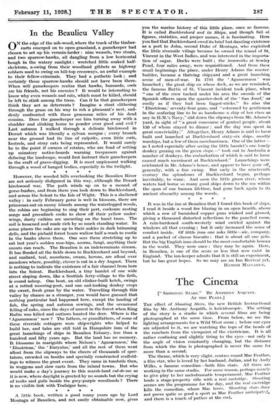However, the wooded hills overlooking the Beaulieu River are not
seriously disfigured in this way, although the Dorset birchwood was. The path winds up on to a mound of gorse-bushes, and from there you look down to Bucklershard, and across the Solent to the Isle of Wight. This is a sheltered- valley : in early February gorse is well in blossom, there are primroses out on mossy islands among the waterlogged woods, the robins are beginning to sing their pert, cocksure nesting songs and greenfinch cocks to show off their yellow under- wings, dusty catkins are uncurling on the hazel trees. The soil is loosened and made rich by so much standing water. In some places the oaks are up to their ankles in dark brimming dells, and the piebald forest boars wallow half a-wash to rootle in the banks above them. One sees them stretching up to eat last year's sodden rose-hips, acorns, fungi, anything their snouts can reach. The Beaulieu is an indeterminate stream. It has flooded all the fields down to Bucklershard and beyond, and mallard, teal, moorhens, swans, herons, are afloat over meadows where, possibly, clover is cut in a dry August. There is nothing to indicate the existence of a fair channel from here into the Solent. Bucklershard, a tiny hamlet of one wide street sloping down, like a Scottish ferry-village to the firth, is sound asleep. One boat, an old clinker-built ketch, swings at a rotted mooring-post, and one sad-looking donkey crops the sweet, fresh grass by the water. Travelling through this valley by chance as a stranger, you would have guessed that nothing particular had happened here, except the landing of fish, the spring and autumn sowings, and the occasional felling of oaks, since the days of unrest in the forest when King Rufus was killed and outlaws hunted the deer. Where is the 4Agamemnon' now ? The fathers, or grandfathers, of some of these riverside cottagers were shipwrights who helped to build her, and tales are still told in Hampshire inns of the great launchings of ships in Beaulieu Estuary, less than a hundred and fifty years ago. But the land has no memory. It blossoms in marigolds where Nelson's Agamemnon,' the Illustrious,' the - Euryalus,' and all the rest of them went afloat from the slipways to the cheers of thousands of spec- tators, crowded on booths and specially constructed scaffold- ings to witness the great event. They came in tumbrils then, in waggons and slow carts from the inland towns. But who would make a day's journey to this marsh-land cul-de-sac as it is now, where daylight is greeted by no sounds but the crying of rooks and gulls beside the grey-purple woodlands ? There is no visible link with Trafalgar here.
* * * *






































 Previous page
Previous page